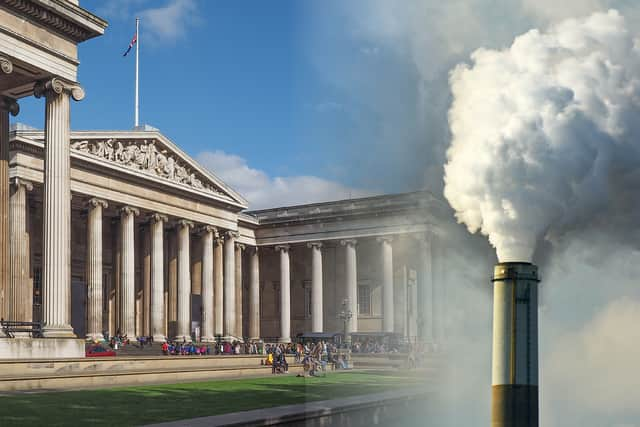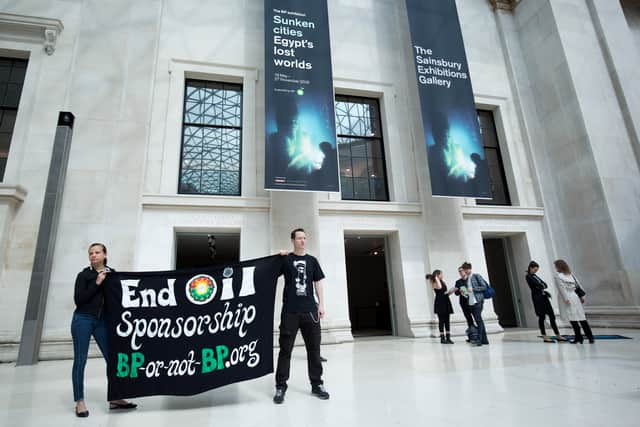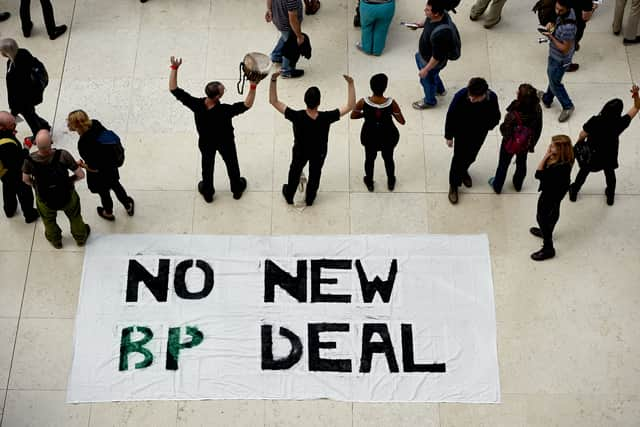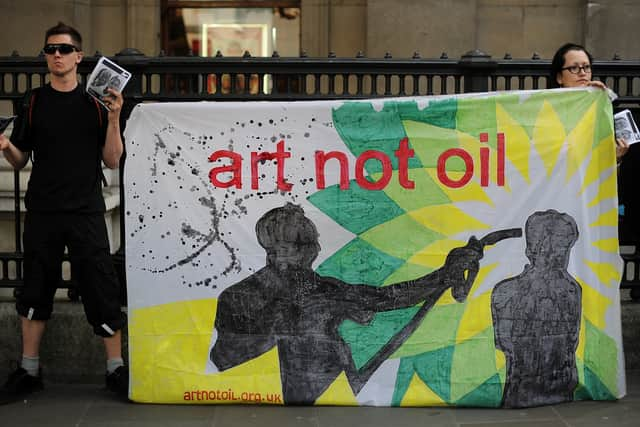British Museum: BP sponsorship called ‘inappropriate’, protests explained and should oil firms fund the arts?
and live on Freeview channel 276
The British Museum will face mass protests against its BP sponsorship this weekend as a decision looms on whether to renew their current contract and 25-year relationship with the “destructive oil giant”.
Pressure is mounting on the institution, as both the National Portrait Gallery and the Scottish Ballet have recently ended their corporate partnership with BP.
Advertisement
Hide AdAdvertisement
Hide AdA member of the activist group ‘BP or not BP?’, which has organised a protest for Saturday (23 April), hopes it will deter the British Museum from being “reckless enough to sign a new deal”.
It will be the fourth anti-BP protest to hit the museum in a month.
NationalWorld has spoken to campaigners to understand more about the protests and the issue of whether oil companies should be funding the UK’s cultural institutions.


What is the anti-BP protest?
Hundreds of people have signed up to the ‘Make BP History’ protest on Saturday (23 April) at the British Museum.
Advertisement
Hide AdAdvertisement
Hide AdOver 300 people have already pledged to take part, which would make it the largest protest at the museum since pre-Covid times.
Participants will also take part in smaller protests all over the museum throughout the afternoon, to highlight “the facts about BP that the museum is trying to ignore”.
This will then be followed by a mass protest inside the museum.
Sarah Horne, a member of BP or not BP? who will be taking part in the protest, said: “The British Museum management seem determined to ignore the destructive behaviour of their sponsor BP.
Advertisement
Hide AdAdvertisement
Hide Ad“So on 23 April, hundreds of us will fill the museum with uncomfortable facts about this deadly company.”
She added: “We will lay down this challenge to the museum director: we know he’s been meeting with BP over a new sponsorship deal. Will he also meet with the people affected by BP?
“Will he speak to the 300 archaeologists and heritage professionals who are calling for the end of this deal, the frontline communities facing BP’s pollution and corruption, and the young people whose future BP is actively destroying? Or is he only interested in speaking to BP?”
Ms Horne said the protest will be “crucial” and hopefully will result in the museum making a “sensible decision” to allow the sponsorship deal to expire.
Advertisement
Hide AdAdvertisement
Hide AdShe told NationalWorld: “If they are reckless enough to sign a new deal with this destructive oil giant, then that wouldn’t just alienate a large swathe of their visitors, members and museum sector workers - it would also invite a whole new wave of protests.
“Public anger against the fossil fuel industry will only increase as the climate crisis deepens.
“Why on earth would the British Museum want to be on the wrong side of that?"


Ms Horne points to the latest Intergovernmental Panel on Climate Change (IPCC) report as an even starker reason as to why the British Museum should not renew its sponsorship deal with the oil giant, as well as the effects BP has had on climate change.
Advertisement
Hide AdAdvertisement
Hide AdIn the report, world scientists issued their bleakest warning yet of rising carbon emissions.
The activist group, BP or not BP?, added: “We can’t let the museum sign a new deal with an oil giant in the middle of a climate crisis.”
She said: “The fact that the director is even considering this means that he’s clearly not been paying attention to all the reports about BP’s devastating climate impacts, support for repressive regimes, misleading greenwash advertising and profiteering from high energy prices.
“This is despite interventions from hundreds of archaeologists, scientists, and other museum professionals calling for an end to the BP deal.”
Who else is campaigning against the sponsorship deal?
Advertisement
Hide AdAdvertisement
Hide AdThe British Museum is run by its Board of Trustees and staff who make all of the decisions.
The Trustees received a formal submission from the research and campaigns organisation, Culture Unstained, which detailed how pushing ahead with a renewed partnership with BP could place them in breach of the museum’s own policies and conflict with standards governing the culture sector.
The submission was put together after Culture Unstained received a response from a freedom of information (FOI) request that the museum’s director, Hartwig Fischer, has been preparing the ground to renew the controversial partnership and has been holding meetings with the oil giant to discuss “options for BP’s support post-Spring 2023” since September 2021.
Their submission to the British Museum has been backed by figures from the fields of climate science, archaeology, culture sector workers and the youth climate strike movement.


Advertisement
Hide AdAdvertisement
Hide AdJess Worth, co-director of Culture Unstained, told NationalWorld: “If the British Museum wants to keep the respect of its young visitors in particular, it should follow the lead of the many other museums and galleries that have recognised their environmental responsibilities, and stop partnering with BP.”
Dr Chris Garrard, also the co-director of Culture Unstained, said that it is “vital” the trustees fulfil their legal duties and make a decision “based not on BP’s own dubious ‘net zero’ claims but on the overwhelming analysis that its investments in new oil and gas do not align with global climate goals.”
Dr Garrard added: “If the board does approve a new deal with BP, it would signal that they chose to sidestep their own sustainability policy and dismiss the reputational risks of partnering with a leading fossil fuel producer as the climate crisis worsens.”
Should oil companies fund the arts?
The activist group BP or not BP? argues that the sponsorship only provides around 0.5% of the British Museum’s annual income and so the relationship between the two is unnecessary.
Advertisement
Hide AdAdvertisement
Hide AdMost of the British Museum’s funding comes from the public through taxes, ticket sales, memberships and sales in the shop and cafe.
The campaigners also point to how other UK art institutions have now ended their relationships with oil companies.
The BP or not BP? campaign said: “Clearly it’s perfectly possible for the arts to manage without oil money.”
In the last six years, at least 14 cultural institutions in the UK have dropped their deals with oil giants.


Advertisement
Hide AdAdvertisement
Hide AdIn February, the National Portrait Gallery announced the end of the company’s 30-year sponsorship of the ‘BP Portrait Award’.
It was also confirmed that the Scottish Ballet had ended its corporate partnership with the oil giant, as well as New Scientist Live following suit.
In 2019, the Royal Shakespeare Company ended its BP sponsorship deal halfway through a five-year contract, saying that “young people are now saying clearly to us that the BP sponsorship is putting a barrier between them and their wish to engage with the RSC.”
Meanwhile in 2016, Tate ended its 26-year sponsorship deal with BP.
Advertisement
Hide AdAdvertisement
Hide AdRodney Harrison, Professor of Heritage Studies at the UCL Institute of Archaeology, University College London, said: “The British Museum’s ongoing relationship with BP is clearly out of step with the rest of the cultural sector.”
The activist group also argued that a renewed sponsorship deal with BP would not send a good message about the role of fossil fuels during a time of current war and conflict.
They said: “We’re in the middle of a huge debate about the role of oil and gas in funding and stoking war and conflict.
“If the museum signs a new BP sponsorship deal, that would send the worst possible signal to the world about the role of fossil fuels in society right now.”
What has the British Museum said?
Advertisement
Hide AdAdvertisement
Hide AdA spokesperson said that the British Museum receives funding from BP “to support the museum’s mission and provide public benefit for a global audience through their support of our temporary exhibition programme.
They said BP is a “long-standing corporate partner” and without their “external support much programming and other major projects would not happen.”
They added: “The British Museum is grateful to all those who support its work in times of reduced funding.
“The Director and Trustees think carefully about the nature and quality of sponsorship before accepting.
Advertisement
Hide AdAdvertisement
Hide Ad“The support they provide helps realise the vision and hard work of curatorial staff and enables our programming to be made available to the widest possible audience.”
BP have been contacted for comment on this story.
Comment Guidelines
National World encourages reader discussion on our stories. User feedback, insights and back-and-forth exchanges add a rich layer of context to reporting. Please review our Community Guidelines before commenting.
